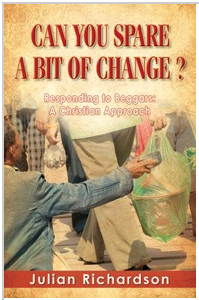This book has the intriguing subtitle, ‘Responding to beggars: a Christian approach’ –– intriguing because most of us have wondered how to respond to beggars and, as Christians, we recognise the call to be compassionate while giving due priority to the gospel.
Julian Richardson admits from the outset that not everyone will agree with his conclusions, and he seems to have written this book to help Christians work out a response to beggars and to poverty –– as opposed to simply reacting to the circumstances we encounter.
In equipping the reader to make a Christian response, the author looks at five categories of beggar –– those in the street or at the door; friends with material needs; opportunists; refugees; and (somewhat anomalously) charities which send ‘begging letters’.
Before tackling these, he lays the groundwork for the book in the form of an overview of biblical and historical material, a section that contains interesting and helpful information. For example, there are expositions of passages from the Old and New Testaments, as well as information on globalisation and industrialisation. Definitions of a number of terms are also given here.
Moving into the main body of the book, Mr Richardson draws on his experiences as a university teacher and gospel worker in Turkey, threading personal anecdotes into his analysis of the five categories mentioned above. While this adds interest for the reader, it is not always clear what is the real point of the stories.
The book ends up as a curious mix of Bible, history and anecdote –– with little real sense of an integrated whole. The emphasis on the gospel is commendable. The book could be of interest to those considering missionary work among Muslims as it gives an insight into cultural attitudes towards money and the need for ministers to be financially self-reliant.
That said, the claim that full-time involvement in gospel ministry lacks biblical warrant may strike some readers as going too far. Food for thought, but a little on the raw side!




